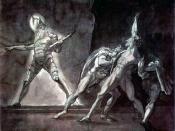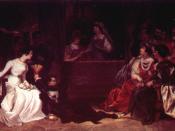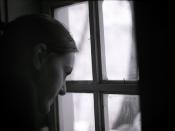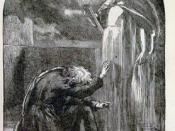The Spirit of King Hamlet In the play Hamlet by William Shakespeare, Hamlet's attitude toward the ghost changed with his new experiences throughout the play. His initial reaction was to agree with what the ghost had asked him to do. As the play progressed, Hamlet began to have second thoughts about the ghost's request. Finally after a great deal of contemplation, Hamlet recognized that the ghost's desires were realistic. Hamlet acted upon his initial reactions. The ghost directed and guided Hamlet's thoughts and behaviors.
It is important to keep in mind that seventeenth century England had strong beliefs in ghosts. Ghosts were common figures in Elizabethan plays. This is why a differentiation must be made between the "good"� ghost and the "bad"� ghost. There are those that are honest and others that are the devil that take on the likeness of someone who has passed on. "The spirit that I have seen/ May be a [dev'l], and the [dev'l] hath the power/ T'assume a pleasing shape"æ"� (3.1.78-80).
When Hamlet encountered the ghost he was unsure whether or not the ghost could be trusted. This affects his judgment at numerous points in the play. For example, "Bring with thee airs from heaven, or blasts from hell,"� (1.4.41). Although the ghost looks like the late King Hamlet dressed in the armor he wore in the battle against Norway he is hesitant to trust the ghost it. Hamlet knew that if the ghost was the late king he would trust it and act on his requests. But, if the ghost was the devil Hamlet must not fall prey to the ghost's manipulations. He should trust his own instincts and act on his own beliefs.
The ghost tries to assure Hamlet that he is the ghost of his father. He told Hamlet that Claudius poisoned him by pouring poison in his ear while he was asleep in the orchard. " The serpent that did sting thy father's life/ Now wears his crown."� (1.5.38-39). The ghost of King Hamlet asked Hamlet to "Revenge his foul and most unnatural murther."� (1.5. 25) By avenging his murder the ghost asked Hamlet to kill King Claudius. The ghost of his father asking him to complete this task faced hamlet with many moral dilemmas. Killing King Claudius would mean Hamlet would be committing regicide, which is one of the worst crimes during this era. He would also be killing kin. People of royalty were believed to be appointed by G-d. The ghost asked Hamlet to commit the same crime as Claudius.
Hamlet thought about the ghost's request to kill King Claudius before acting. He hesitated because he was not sure if he could trust the ghost. He still had a feeling that it could be the devil acting as the ghost of his father. As the ghost vanished he seemed to be devoted to completing the tasks set for him by his father. After thinking things through it seemed as if he begun to regret the obligations that he made to his father.
It is difficult to definitely distinguish whether the ghost was good or bad. When the ghost asked Hamlet to kill King Claudius, he may have been helping Hamlet realize by carrying out this act he was avenging his father's death (which was common during this period of time). However, its hard to believe that Hamlets father wanted him to commit regicide and kill kin which was the same crime committed by Claudius.
The ghost also asked Hamlet to remember him. "Hamlet had promised the ghost to remember him, letting his father's commandment live all alone within his brain"æ"� (Adelman in Wofford 257) There is the theory that Hamlet and the two guards created the ghost because they were upset with the order in Denmark. The ghost "is a cultural marker of absence, a reminder of loss."� (Garber in Wofford 300). Perhaps, the ghost was a figment of Hamlet's imagination, a constant reminder of his father. It seemed like every time Hamlet forgot what his propose of his task, the ghost would reappear. The ghost seemed to serve as a cue to stay on task. Based on these theories Hamlet acted appropriately.





